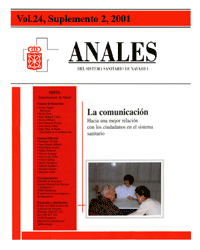Counselling: a technology for the wellbeing of the professional
DOI:
https://doi.org/10.23938/ASSN.0422Keywords:
Autocuidados. Emociones. Conductas. Comunicación. Cambio.Abstract
This paper presents the basic knowledge, attitudes and skills that are required for an effective use of Counselling (assisted advice) in the care of patients/users/clients. Attention is drawn to the benefits that such use brings for the health professional him/herself, in relation to dealing with their own emotions and those of the patients, and to facilitating lasting changes in the behaviour patterns of users and relatives. The guiding ideas are: From the point of view of Counselling health is understood to be a right that all citizens are entitled to (including patients and health professionals of course), not an obligation; and this takes concrete form in specific contents and methods. Counselling assigns the patient the role of "driver" (of his health-disease process) and the professional the role of "facilitator" ("co-driver" of that driving.) Counselling contemplates three types of skill: emotional (intra and interpersonal), communication and motivation for change. The skills make it possible to control the development and intensity of the emotional alterations that appear in patients, in relatives and in the professionals themselves. In communication with the user, the "music" (that which is non-verbal, how communication is carried out) is as or more important than the "wording" (that which is verbal, what is communicated). It is difficult to promote lasting changes in the behaviour patterns of users without previously carrying out a rigorous diagnosis of behaviour. The first and greatest beneficiary of Counselling is the professional who practices it, who can achieve his aims in a more efficient way and at the least personal cost. Habitual practice of Counselling is a good way of preventing the emergence of difficult, aggressive and emotionally overwhelming situations. It is probable that Counselling will bring about a crisis in the contents and, above all, in the forms of practice; this is magnificent since it offers the possibility of incorporating changes.Downloads
Downloads
Published
How to Cite
Issue
Section
License
La revista Anales del Sistema Sanitario de Navarra es publicada por el Departamento de Salud del Gobierno de Navarra (España), quien conserva los derechos patrimoniales (copyright ) sobre el artículo publicado y favorece y permite la difusión del mismo bajo licencia Creative Commons Reconocimiento-CompartirIgual 4.0 Internacional (CC BY-SA 4.0). Esta licencia permite copiar, usar, difundir, transmitir y exponer públicamente el artículo, siempre que siempre que se cite la autoría y la publicación inicial en Anales del Sistema Sanitario de Navarra, y se distinga la existencia de esta licencia de uso.








